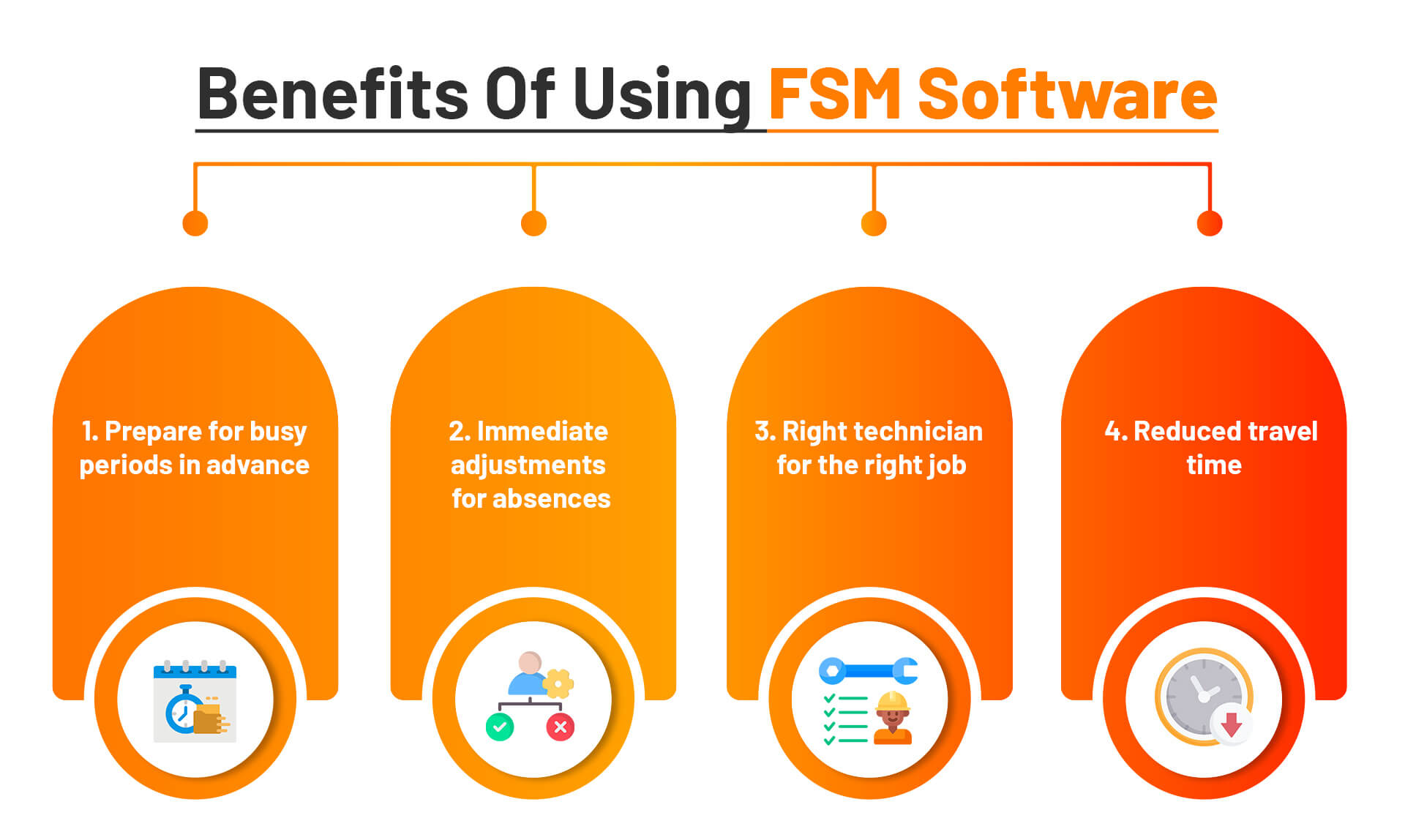Balancing technician availability with customer demand is a significant challenge for many service-based businesses. The main goal is to ensure that customers receive timely service while making the best use of available technicians. However, various factors can disrupt this balance, leading to inefficiencies and dissatisfied customers.
Before we delve into the problems and the right solutions, let’s look into the substantial benefits and advantages of implementing FSM software in your operations.
Benefits Of Using FSM Software

Problems That Businesses Face Without FSM
A. Fluctuating Customer Demand
Customer service requests can vary greatly from day to day. For instance:
- Weekdays vs. Weekends: Many businesses experience higher demand during weekdays when customers are more likely to request services. Weekends may see a drop in requests, but certain services (like emergency repairs) might still be in high demand.
- Weather Conditions: Extreme weather can lead to a sudden increase in demand for specific services. For example, a heatwave might spike air conditioning repair requests, while a storm could cause a surge in plumbing or roofing services.
- Local Events: Events like local festivals, marathons, or construction work can also impact service requests. These events might increase demand for certain services while reducing it for others.
- Seasonal Peaks: Seasonal variations play a significant role in fluctuating customer demand. Many industries have predictable busy seasons:
- HVAC Services: Demand for heating services peaks in winter, while cooling services are in high demand during summer.
- Retail and E-commerce: The holiday season often sees a spike in demand for delivery and installation services as people purchase gifts and new appliances.
- Landscaping and Gardening: Spring and summer typically bring higher demand for landscaping, gardening, and outdoor maintenance services.
How FSM Solves Fluctuating Customer Demand:
Field Service Management (FSM) software offers an effective solution to manage these fluctuations by optimizing scheduling, improving resource allocation, and enhancing overall efficiency. Here’s how FSM software can address the issues of daily variability, seasonal peaks, and their impact on the workforce.
Optimized Scheduling:
- Dynamic Scheduling: FSM software can dynamically adjust schedules based on real-time demand.
- Predictive Analytics: The software can analyze historical data to predict demand patterns.
Real-Time Adjustments:
- Weather Integration: FSM software can integrate with weather forecasting tools to predict and prepare for demand spikes caused by extreme weather conditions.
- Event Management: By tracking local events, the software can adjust schedules to account for increased or decreased demand.
B. Variable Technician Availability
Balancing technician availability with customer demand becomes even more challenging when the availability of technicians is unpredictable. Several factors can cause technician schedule variability, leading to workforce management complications. Here’s a closer look at these factors and their impacts.
- Technicians may have unpredictable schedules due to personal reasons, vacations, or sick leave.
- Part-time or contract technicians may only sometimes be available when needed.
How FSM Solves Variable Technician Availability:
- Real-Time Tracking and Adjustments:
- Availability Tracking: The software tracks the availability of all technicians, including part-time and contract workers, ensuring that the schedule is always up-to-date.
- Proactive Workforce Management:
- Automated Alerts: The software can send automated alerts to managers when a technician’s availability changes, allowing for immediate adjustments.
- On-Call Technicians: Maintain a pool of on-call technicians who can be quickly deployed to cover for absences or increased demand.
- Efficient Resource Allocation:
- Skill Matching: FSM software matches technicians’ skills with job requirements. If a skilled technician is unavailable, the software identifies other qualified technicians to take over the task.
- Flexible Workforce Planning:
- Part-Time and Contract Technician Management: The software manages the schedules of part-time and contract technicians, ensuring their availability is maximized during peak times.
C. Skill Matching
Different Service Calls Require Different Skill Sets:
- Complex Repairs: These require advanced knowledge and specialized skills.
- Routine Maintenance: These may need only basic skills.
Challenges in Ensuring the Right Technician for the Right Job:
- Variability in Technician Availability: Technicians may only sometimes be available when needed.
- Variability in Customer Requests: Service calls can differ greatly in their requirements.
Consequences of Misalignment:
- Inefficient Service: Misaligning skills can lead to inefficiencies and longer job completion times.
- Decreased Customer Satisfaction: Customers are likely dissatisfied if jobs are not completed correctly or promptly.
How FSM Software Solves Skill Matching Problems
- Skill Profiles: FSM software maintains detailed skill profiles for each technician, including certifications, experience levels, and areas of expertise.
- Certification Management: Track certifications and training for each technician to ensure they are qualified for specific tasks.
- Automated Matching: The software automatically matches technicians to jobs based on their skills and the requirements of the service call.
- Availability Integration: FSM software considers technician availability when assigning jobs, ensuring that only available and qualified technicians are scheduled.
- Priority Management: The software can prioritize urgent or complex jobs and assign the most skilled technicians to handle them promptly.
- Quality Assurance: By matching the right technician to the right job, FSM software ensures high-quality service, leading to increased customer satisfaction.
D. Geographical Constraints
Travel Requirements
- Different Locations: Technicians often need to travel to various customer locations to complete service calls. This can be especially challenging in areas with heavy traffic or long distances between jobs.
- Time-Consuming: Traveling between locations can consume a significant portion of a technician’s workday, reducing the time available for actual service tasks.
Impact of Inefficient Routing
- Increased Travel Time: Without optimized routing, technicians might spend more time on the road. This not only delays service delivery but also reduces the number of service calls they can complete in a day.
- Fewer Completed Service Calls: Inefficient travel routes mean fewer customers are served each day, leading to lower overall productivity and potentially longer wait times for customers.
How FSM Software Solves Geographical Constraints
- Optimized Routing:
- Route Optimization Algorithms: FSM software uses advanced algorithms to optimize travel routes for technicians, minimizing travel time and maximizing the number of service calls completed each day.
- Real-Time Traffic Data: Integrates real-time traffic data to adjust routes dynamically, avoiding traffic jams and other delays.
- Efficient Scheduling:
- Clustered Appointments: The software schedules service calls in clusters based on geographic proximity, reducing travel distances between jobs.
- Time Slot Optimization: Assigns time slots based on technician availability and location to ensure minimal travel time.
- GPS Integration:
- Real-Time Navigation: Provides technicians with real-time navigation tools, ensuring they follow the most efficient routes.
- Location Tracking: Tracks technician locations in real-time, allowing for dynamic re-routing if necessary.
- Enhanced Communication:
- Customer Notifications: Notifies customers of estimated arrival times and updates them on any delays, improving transparency and customer satisfaction.
- Technician Updates: Keeps technicians informed of any changes in their schedules or routes, allowing for quick adjustments.
E. Last-Minute Changes
Emergency Service Requests
- Disruption of Planned Schedule:
- When a technician is redirected to an emergency call, their pre-planned schedule is disrupted.
- This can lead to delays in attending other scheduled appointments, causing delays throughout the day.
- Unexpected Urgency:
- Customers may face urgent issues that require immediate attention, such as a broken heater in winter or a plumbing leak.
- These emergencies demand prompt responses, often requiring technicians to drop their current tasks and address the urgent call.
Cancellations
- Last-Minute Cancellations:
- Customers may cancel or reschedule appointments at the last minute, leaving a gap in the technician’s schedule.
- This unplanned free time can lead to inefficiencies if not quickly filled with another task.
- Resource Wastage:
- A technician who has prepared for a specific job may waste their time if a cancellation occurs without a backup plan.
- This can also result in lost revenue for the business if the slot remains unfilled.
Challenges in Adjusting Schedules
- Reallocation of Technicians:
- Reassigning technicians to new tasks or adjusting their routes on short notice is challenging.
- This requires real-time visibility into the availability and location of all technicians.
- Impact on Other Appointments:
- Adjusting one technician’s schedule can affect others, leading to a domino effect of changes.
- Ensuring that all customers still receive timely service becomes a complex juggling act.
How FSM Software Solves Last-Minute Changes
- Real-Time Schedule Adjustments:
- Dynamic Scheduling: FSM software dynamically adjusts schedules in real-time, allowing for quick reallocation of tasks when emergencies arise or cancellations occur.
- Automated Reassignments: The software can automatically reassign jobs to available technicians based on their skills, location, and current workload.
- Emergency Management:
- Priority Handling: FSM software prioritizes emergency service requests and ensures the nearest and most qualified technician is dispatched immediately.
- Backup Plans: By maintaining a pool of on-call technicians, the software ensures that emergencies are handled without significantly disrupting other scheduled appointments.
- Handling Cancellations:
- Instant Reallocation: When cancellations occur, FSM software quickly identifies other pending tasks or nearby jobs that can fill the gap, ensuring efficient use of technician time.
- Proactive Rescheduling: The software notifies other customers of available earlier slots, potentially moving up appointments and minimizing idle time.
- Efficient Resource Utilization:
- Real-Time Visibility: FSM software provides real-time visibility into technician locations and availability, making reassigning tasks and optimizing routes easier.
- Skill Matching: The software ensures that reassigned tasks match the technician’s skills and qualifications, maintaining service quality.
We have thoroughly examined the significant challenges that arise from not utilizing Field Service Management (FSM) software and providing comprehensive solutions to address these issues.









